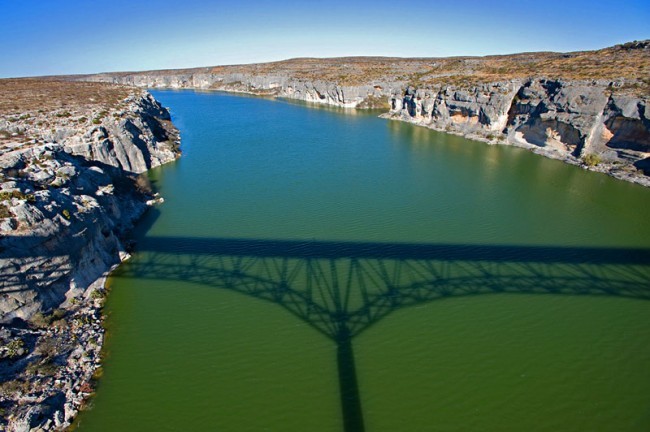
Photo by OneEighteen.
Atlas Shrugged (and eventually, so did I)
Some people try to make a boring speech more interesting by throwing in a story or two. In Atlas Shrugged, Ayn Rand does the opposite - stuffing a mediocre story full of excessive diatribes and long-winded monologues. The result is a sad hybrid of philosophy and fiction that brings out the worst in each. It's a philosophical text that lacks the structure and rigour of a treatise, and at the same time a poorly-told story that cannot stand on its own.
If you haven't read Atlas Shrugged, and want to, you'd better stop here because there will be spoilers.
I will concede that it was a book that made me think. Virtually every page contained an opinion, accusation, or challenge, forcing me to evaluate and justify my own assumptions about the ideal socio-political system. This is what I gathered as my own Coles Notes version of Rand's philosophy in Atlas Shrugged:
- It is right to earn rewards based on merit, but wrong to receive alms based on need. Charity is blasphemy against the sanctity of human ability.
- People should be rewarded commensurate to their ability, even if the reward is exceedingly above anything they could hope to spend or need. The fruits of their labour - and nobody else's - are theirs by right.
- Nobody should feel compelled to sacrifice for the sake of others. If one acts for the benefit of another, that benefit ought to be a mere byproduct of the pleasure gained by the actor.
- Healthy capitalism means businesses do not cut corners to make profit, but see labour as an investment in the highest calibre of skilled workers.
- Those who implement an idea are infinitely in debt to the person who thought of the idea in the first place.
- It is futile to talk about the public good without first specifying which public you're talking about.
- One has no moral duty except to one's own rational mind.
- It is wrong to gain power or wealth by means of bribery, favours, loopholes, extortion, imposed monopoly, or force.
- A society that rejects need and celebrates ability will see its members use their minds to overcome any obstacles, thereby producing enough value to exchange for all their wants and needs.
I won't get into too much detail about my position on the above bullet points, but suffice it to say that I think they are mostly wrong.
The overwhelming sense in my mind as I read Atlas Shrugged was, "get on with it!" - the characters' endless inner monologues quickly became repetitive, reducing their persuasive impact. It was the equivalent of the type of person who has made their point long ago, but keeps talking in circles because nobody has forced them to shut up yet. I could only get through John Galt's speech - that arrogantly, pretentiously long lecture - by keeping track of the page numbers and reminding myself that I was not, in fact, reading the same paragraphs over and over.
The narrative also suffered from repetition and a lack of originality. If you're going to write a 1,200-page book, you've got to find some more creative ways of describing how Dagny's clothes frame the fragility of her feminine body.
Probably the biggest disappointment for me was the entire concept of Galt's Gulch. The idea that if you disagree with the prevailing social order, you and your friends can carve out a little piece of the world and live in peace without having to worry about anything or anybody else. Oh, and that such a place will have plentiful copper resources, agricultural lands, metal ore for smelting, and enough space for each person to live in whatever kind of house he chooses - whether it be a secluded cabin in a forest or near the main market street.
Ayn Rand's glorification of the rational mind goes to such extremes as to make her philosophy nothing more than a pipe dream. The idea that by sheer willpower, Hank Rearden could buy up depleted mines and find some way to extract more minerals from them is a cop-out at best. No need for the people of Galt's Gulch to worry about energy security either - John Galt figured out how make a motor that produces electricity from the air. How convenient!
If you're like me and consider a 1,200-page book to be a fairly arduous endeavour, Atlas Shrugged is not worth reading. The story is not compelling on its own merits. None of the characters are likeable, and the plot is simply a vehicle for the author to project her philosophy in the form of fictional monologues.
There are entrenched notions of good and bad, which do not shift at all through the course of the book. Instead, the same themes, opinions, and scenarios are played out again and again, like a punished schoolchild forced to keep writing a lesson on the blackboard until his hands begin to bleed.
Sam Nabi